Audio Mirror WAVE tube preamplifier By Terry London
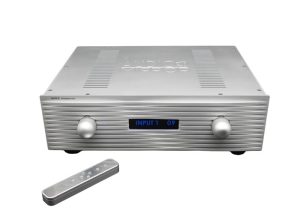
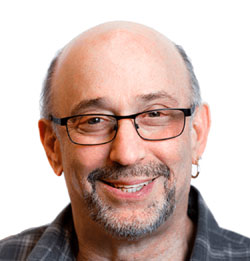 In 2020, I reviewed the Audio Mirror Tubadour III SE DAC (reviewed here). It was stellar in its performance, competing with DACs that cost twice as much and was exceptionally well built using very high-quality internal parts. Audio Mirror is located in Burnsville, MN, and owner /designer Vladimir Bazelkov hand-builds each Audio Mirror piece. About four months ago, Vladimir asked if I would be interested in reviewing his new reference preamplifier, the WAVE tube-based line-stage that retails for $13,000. Based on my experience with his excellent Toubadour III SE DAC, I welcomed his invite to be the first to hear/review his all-out assault on building a world-class tube-based line-stage.
In 2020, I reviewed the Audio Mirror Tubadour III SE DAC (reviewed here). It was stellar in its performance, competing with DACs that cost twice as much and was exceptionally well built using very high-quality internal parts. Audio Mirror is located in Burnsville, MN, and owner /designer Vladimir Bazelkov hand-builds each Audio Mirror piece. About four months ago, Vladimir asked if I would be interested in reviewing his new reference preamplifier, the WAVE tube-based line-stage that retails for $13,000. Based on my experience with his excellent Toubadour III SE DAC, I welcomed his invite to be the first to hear/review his all-out assault on building a world-class tube-based line-stage.
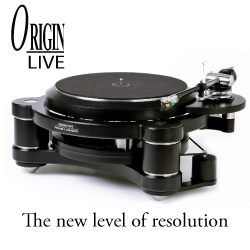 When the Audio Mirror WAVE arrived, the packaging protected the preamplifier from possible damage during shipping. I was surprised at the weight, which is a robust 20 pounds. The gray aluminum chassis was composed of thick plates, with the front having an engraved “wave” pattern, which somewhat reminded me of the classical front panels of Jeff Rowland gear. Rowland’s gear is a highly polished clear aluminum color, while the WAVE’s color is a matte gray. The overall appearance of the Audio Mirror WAVE line stage was aesthetically a mixture of traditional and futuristic that I found pretty attractive. The unit’s dimensions are 17 inches in length, 14 inches in depth, and 6.5 inches in height. The line stage is supported by four attached Isoacoustics GAIA footers for vibration control. On the sculptured front, two knobs control volume and input. The left knob also controls turning on the WAVE or putting it on standby. In the middle is a blue LED screen displaying which input and volume level are used. The remote control can control the brightness of the screen. The remote control is an all-aluminum piece that controls the volume, brightness of the display, and inputs and matches the build quality of the WAVE line stage. I have had many very expensive preamplifiers in for review that came with cheap plastic remotes that do not match the quality/price of the line stage. Not in this case; Audio Mirror’s remote control is at the same level of quality as the line stage you deserve when spending 13K on a preamplifier.
When the Audio Mirror WAVE arrived, the packaging protected the preamplifier from possible damage during shipping. I was surprised at the weight, which is a robust 20 pounds. The gray aluminum chassis was composed of thick plates, with the front having an engraved “wave” pattern, which somewhat reminded me of the classical front panels of Jeff Rowland gear. Rowland’s gear is a highly polished clear aluminum color, while the WAVE’s color is a matte gray. The overall appearance of the Audio Mirror WAVE line stage was aesthetically a mixture of traditional and futuristic that I found pretty attractive. The unit’s dimensions are 17 inches in length, 14 inches in depth, and 6.5 inches in height. The line stage is supported by four attached Isoacoustics GAIA footers for vibration control. On the sculptured front, two knobs control volume and input. The left knob also controls turning on the WAVE or putting it on standby. In the middle is a blue LED screen displaying which input and volume level are used. The remote control can control the brightness of the screen. The remote control is an all-aluminum piece that controls the volume, brightness of the display, and inputs and matches the build quality of the WAVE line stage. I have had many very expensive preamplifiers in for review that came with cheap plastic remotes that do not match the quality/price of the line stage. Not in this case; Audio Mirror’s remote control is at the same level of quality as the line stage you deserve when spending 13K on a preamplifier.

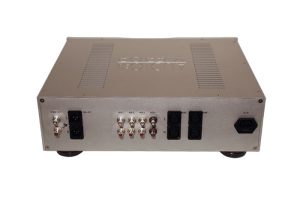
On the back of the Audio Mirror WAVE line stage are four pairs of unbalanced RCA inputs and two balanced XLR inputs. There are two pairs of outputs: balanced XLR and unbalanced RCA. There is a switch that routes the output signal. Internally, the Audio Mirror’s circuit topography is a balanced transformer linked with no capacitors in the signal path. It uses premium Lundahl transformers and highly regarded parts from some of the most respected US and European manufacturers. When I had my technician look at the internal build quality and part selection, seeking his opinion regarding these matters, he was very impressed with both. He saw that the financial investment in part selection validated the ultimate price of this preamplifier. The Audio Mirror WAVE is tube rectified using a single 6X5 tube. Gain tubes are the highly respected, relatively inexpensive, and accessible Russian 6C45P-E/6C45П-E tube.
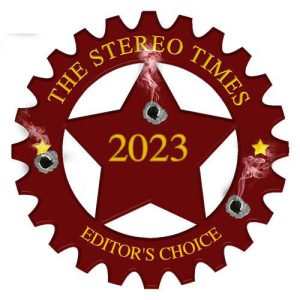 Besides what is stated above, the build quality, internal parts selection, and overall beautiful aesthetic appearance of the Audio Mirror WAVE, the following description of its sonic performance will give the details of why I chose the WAVE line stage as my choice for Stereo Times 2023 Most Wanted Component.
Besides what is stated above, the build quality, internal parts selection, and overall beautiful aesthetic appearance of the Audio Mirror WAVE, the following description of its sonic performance will give the details of why I chose the WAVE line stage as my choice for Stereo Times 2023 Most Wanted Component.
The Audio Mirror WAVE has the most silent black ground of any valve-based preamplifier I have ever had in my system. It is at a vanishing low level if it has a noise floor. All images emerge from an ambient field that gives you a sense of the recording venue as much as the musicians themselves. The WAVE also produces a panoramic soundstage if the recording has excellent spatial dimensions, with pinpoint placement of the instruments.
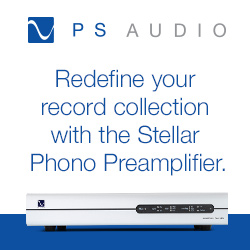 Another sonic virtue of the Audio Mirror WAVE is an overall luxurious “silkiness” that equates ease/effortlessness to the overall presentation of the music. Another way of representing this attribute would be what most listeners would describe as a sense of grainlessness or liquidity. All the micro-details and subtle nuances of the music are present but float out into your acoustic space naturally.
Another sonic virtue of the Audio Mirror WAVE is an overall luxurious “silkiness” that equates ease/effortlessness to the overall presentation of the music. Another way of representing this attribute would be what most listeners would describe as a sense of grainlessness or liquidity. All the micro-details and subtle nuances of the music are present but float out into your acoustic space naturally.
The tonality/timbres that the Audio Mirror WAVE creates have a pureness in color that rivals the best I have heard coming from a line stage. It reminds me of the type of beautiful tonality that I have experienced from listening to SET power amplifiers that run 2A3 tubes. The 2A3 tube is even more lifelike in its rendering of tonality/color than even the mighty 300B tube.
Finally, the Audio Mirror WAVE level of transient speed and macro-dynamics leads to a sense of aliveness/PRAT that engages the listener to “wake up” and pay attention to the music. This wake-up is not experienced as a bright “in your face” presentation but draws you into the pulse and drive of the music.
If you are looking for a preamplifier to give you warmth and romance, then the Audio Mirror WAVE line stage will not be your “cup of sonic tea.” I have the excellent AricAudio Motherlode MK II 6SN7 tube-based line stage in my preamplifier collection. The Motherlode MKII and its NOS 1945 TungSol black glass round plate tubes render a beautiful tonality, excellent micro-details, 3D imaging, and a flushed-out midrange band. Do I thoroughly enjoy this type of presentation of music in my system? Unequivocally, yes. Do I find the Audio Mirror WAVE and its outstanding sonic qualities equally enjoyable? Indeed, I do. This is where personal taste and system synergy come into play. Both are great-sounding tube-based line stages. Another way to explain the differences would be to compare the sound of a great NOS Telefunken 12AU7 to a NOS Mullard 12AU7. Both are exquisite but different in their overall presentation of music.
.jpg?KeepThis=true&TB_iframe=true&height=430&width=700) Two recordings that would exemplify how terrific the Audio Mirror WAVE line-stage production of music is are the Jesse Davis group and the Rick Germanson piano quartet, both recorded live at Smalls Jazz Club in NYC. On both recordings, the WAVE produced the pop/drive/aliveness of both these groups performing alive in front of an attentive audience. Each musician’s unique tonality was heard with the utmost purity, and the banter between the musicians and, at times, with the audience could be heard. The sheer dynamics of the drumming on both recordings came through and ignited each band’s pace and rhythmic foundation. Finally, the spatial aspects of Smalls Jazz Club and even how they set up each band were captured with such great accuracy that the illusion I was there was quite convincing.
Two recordings that would exemplify how terrific the Audio Mirror WAVE line-stage production of music is are the Jesse Davis group and the Rick Germanson piano quartet, both recorded live at Smalls Jazz Club in NYC. On both recordings, the WAVE produced the pop/drive/aliveness of both these groups performing alive in front of an attentive audience. Each musician’s unique tonality was heard with the utmost purity, and the banter between the musicians and, at times, with the audience could be heard. The sheer dynamics of the drumming on both recordings came through and ignited each band’s pace and rhythmic foundation. Finally, the spatial aspects of Smalls Jazz Club and even how they set up each band were captured with such great accuracy that the illusion I was there was quite convincing.
If the qualities of purity of tonality, a vanishing low noise floor (lowest for a tube-based design I have ever heard), spatial accuracy, panoramic sound-staging, and world-class transient speed and a sense of aliveness you only experience in live music are what you are looking for in a tube-based line-stage, then the Audio Mirror WAVE tube-based line-stage should be on your audition list.
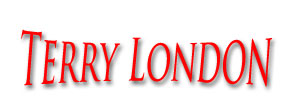

Specifications:
Price: $13,000 USA
Frequency Response:
15hz – 70kHz +/- 3db
THD 0.01%
S/N ratio >90db
Inputs:
Total inputs 6
Four unbalanced linear inputs
Two balanced linear inputs
47k Ohm impedance
Outputs:
1 XLR balanced output 100 Ohm impedance
1 RCA unbalanced output 100 Ohm impedance
Output voltage up to 6V
Preamp gain is 5
Dimensions:
17 x 14 x 6.5 inches
20 lb weight
Tubes used:
1 x 6X5 rectifier
2 x 6С45П gain stage Associated Equipment:
TJ’s Associated Equipment:
Mark Levinson 31.5 transport
Pro-Ject reference CD transport and linear Tube Audio power supply
CEC-3 belt-driven transport
Pass Labs-DAC 1
Reimyo TUKO DAC
Amplification:
Coda #16 amplifier
Coda FET 07x preamplifier
SPL Elector preamplifier
SPL S1200 amplifier
AricAudio SET 300B amplifier
AricAudio Motherlode MKIII preamplifier
Loudspeakers:
NSMT System Two
Tekton Design Ulberth
Accessories:
Black Cat Cables- Digit 110 AES/EBU- 3202 XLR ICs
Kirmuss Audio Adrenaline speaker wire
Krolo Design reference rack & footers
Lateral Audio-Arena APX Isolation Device (Disks)
Puritan Labs Conditioner & circuit grounding system
Audio Archon power cords
Stereo Times Masthead
Publisher/Founder
Clement Perry
Editor
Dave Thomas
Senior Editors
Frank Alles, Mike Girardi, Russell Lichter, Terry London, Moreno Mitchell, Paul Szabady, Bill Wells, Mike Wright, and Stephen Yan,
Current Contributors
David Abramson, Tim Barrall, Dave Allison, Ron Cook, Lewis Dardick, John Hoffman, Dan Secula, Don Shaulis, Greg Simmons, Eric Teh, Greg Voth, Richard Willie, Ed Van Winkle, Rob Dockery, Richard Doran, and Daveed Turek
Site Management Clement Perry
Ad Designer: Martin Perry


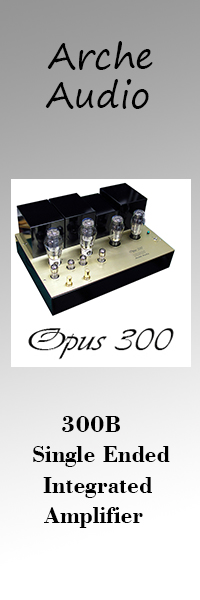
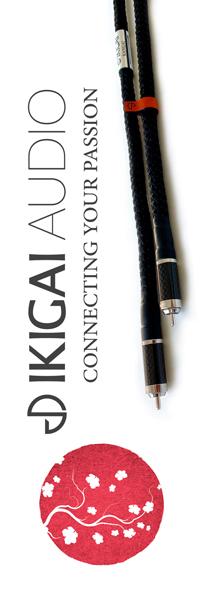
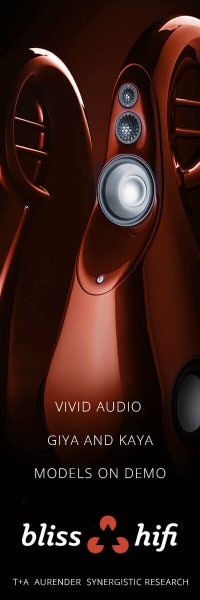
Be the first to comment on: Audio Mirror WAVE tube preamplifier By Terry London